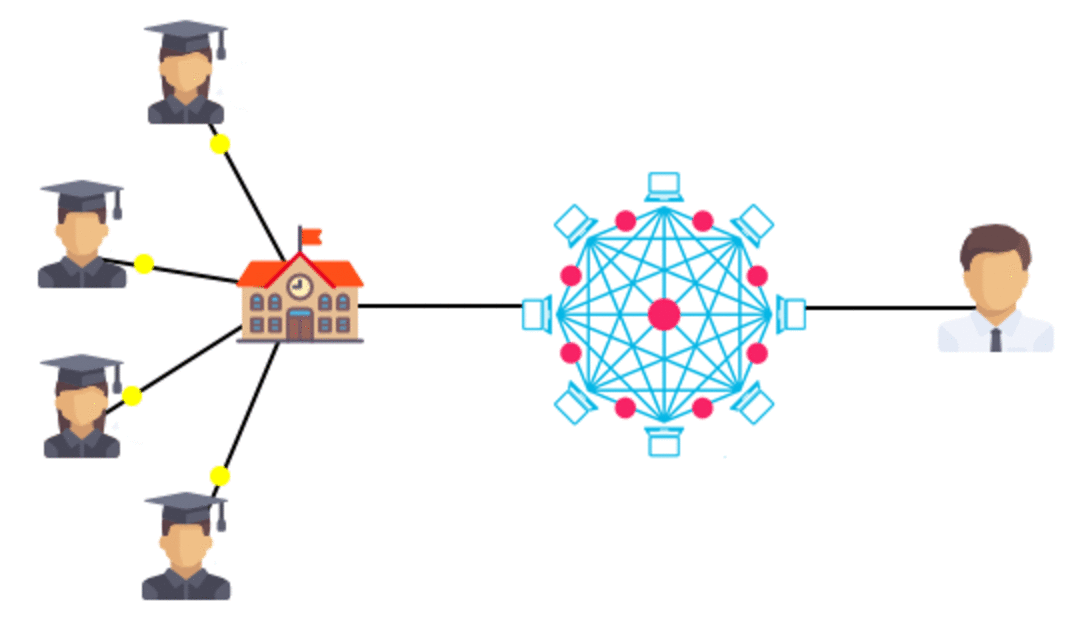
- March 9, 2024
- Samiran Mondal
- 0
Introduction:
The education sector stands on the cusp of a digital revolution, with blockchain technology poised to redefine how academic credentials are managed, verified, and shared. In this article, we delve into the transformative potential of blockchain in education, exploring its benefits, challenges, and real-world applications.
Understanding Blockchain Technology:
Blockchain technology, the backbone of cryptocurrencies like Bitcoin, is a decentralized ledger system that records transactions across a network of computers. Each transaction, or “block,” is securely linked to the previous one, forming a chain of blocks. This distributed ledger system ensures transparency, immutability, and security, making it an ideal solution for various industries, including finance, supply chain management, and now, education.
Current Challenges in Education Credentialing:
Traditional methods of credential verification in education are often cumbersome, time-consuming, and susceptible to fraud. Manual verification processes, reliance on paper-based records, and centralized credentialing authorities contribute to inefficiencies and inconsistencies in credential verification. Moreover, the proliferation of fake diplomas and academic certificates further exacerbates the challenge of verifying the authenticity of academic credentials.
Blockchain Solutions:
Blockchain technology offers a decentralized and transparent solution to the challenges plaguing education credentialing. By securely recording academic credentials on a blockchain network, institutions can create tamper-proof digital records that are easily verifiable by employers, academic institutions, and other stakeholders. Blockchain-based credentialing systems eliminate the need for intermediaries, reduce administrative costs, and enhance trust and transparency in the credential verification process.
Real-World Applications:
Several institutions and organizations have already begun exploring blockchain solutions for education credentialing. For example, the Massachusetts Institute of Technology (MIT) has developed a blockchain-based digital credentialing system called “Blockcerts,” allowing students to securely store and share their academic credentials. Similarly, the University of Nicosia in Cyprus has pioneered the use of blockchain technology for issuing and verifying academic certificates, diplomas, and transcripts.
Challenges and Considerations:
While blockchain technology holds immense promise for transforming education credentialing, several challenges and considerations must be addressed. Scalability, interoperability, data privacy, and regulatory compliance are among the key challenges facing the widespread adoption of blockchain in education. Moreover, the need for standardization and collaboration among stakeholders is essential to ensure the seamless integration of blockchain-based credentialing systems.
Future Outlook:
Despite the challenges, the future of blockchain in education looks promising. As awareness and adoption of blockchain technology continue to grow, we can expect to see more institutions and organizations embracing blockchain-based credentialing systems. With increased transparency, security, and efficiency, blockchain has the potential to revolutionize the way academic credentials are managed, verified, and shared in the digital age.
Conclusion:
In conclusion, blockchain technology holds the key to addressing the longstanding challenges in education credentialing. By leveraging the power of decentralization, transparency, and immutability, blockchain has the potential to create a more secure, efficient, and trustworthy credentialing ecosystem. As we navigate the complexities of the digital age, blockchain stands as a beacon of hope for transforming education and unlocking new opportunities for learners worldwide.
